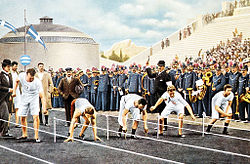Heats
The first round of heats took place on 6 April. The first heat of the 100 metres was the first competition held in the Games. Francis Lane won the first heat, thus becoming the first winner of a modern Olympic race. All heats were won by athletes from the United States.
Heat 1
The Official Report states that there were a total of 21 competitors, divided into three groups; there should therefore have been 7 athletes in each heat. The Official Report names only the top two runners, Lane and Szokolyi. [5] Butler writes that the first heat had "two Hungarians, a Chilian, a Frenchman, a German, an Englishman and an American." [6] Mallon & Widlund list Lane, Szokolyi, Gmelin, Grisel, and Doerry. Megede places André Tournois as the French competitor, rather than Grisel (who Megede does not list at all), omits Doerry (who Megede puts in heat 2), and includes Leonidasz Manno and Luis Subercaseaux. [7] Olympedia follows Mallon & Widlund, also including Manno, Tournois, and Subercaseaux in a list of non-starters not attached to particular heats (this list includes 12 athletes, bringing Olympedia's total entrants to 27 rather than 21). [1]
Heat 2
The Official Report states that there were a total of 21 competitors, divided into three groups; there should therefore have been 7 athletes in each heat. The Official Report names only the top two runners, Curtis and Chalkokondylis. [5] Butler writes of the second heat that Curtis beat "a Greek, an Englishman, two Frenchmen, a Dane, and a Hungarian." [6] Mallon & Widlund list Curtis, Chalkokondylis, Elliot, Schmidt, and Marshall. Megede places Alexandre Tuffère as the French competitor, including him at 3rd place above Elliott; Megede also has Kurt Doerry in this heat instead of the first one (indicating he started but did not finish the heat) and omits Marshall entirely. [7] Olympedia follows Mallon & Widlund, also including Tuffère in a list of non-starters not attached to particular heats. Other non-starters listed by Olympedia that could be a second Frenchman or a Hungarian to match Butler's list are André Tournois, Louis Adler, István Zachar, and Nándor Dáni. [1]
Heat 3
Both Burke and Hofmann were more well known for middle-distance events rather than sprinting. Burke's time of 11.8s became the standing Olympic record. It is not clear which athlete received which place between the fourth and fifth finishers.
The Official Report states that there were a total of 21 competitors, divided into three groups; there should therefore have been 7 athletes in each heat. The Official Report names only the top two runners, "an American (Burke)" and Hofmann. [5] Butler writes of the final heat that Burke beat "a Swede, two Greeks, and three Germans." [6] Mallon & Widlund list Burke, Hofmann, Traun, Gennimatas, and Sjöberg. Megede omits Traun, places Sjöberg 3rd and Gennimatas 5th, and includes Nándor Dáni at 4th. [7] Olympedia follows Mallon & Widlund; non-starters (not attached to particular heats in Olympedia) include Flatow and Mouratis. [1]
Final
The final of the 100 metre race, run on 10 April, involved the six runners who had finished in the top two of their preliminary heats. Curtis scratched from the final as he had also qualified for the final of the 110 metre hurdles, which was the next race on the program (Curtis won that race).
Burke beat his companion from the third heat, Hofmann, by two meters. In a thrilling contest for third place, Lane and Szokolyi dead-heated, both men beating Chalkokondylis by six inches. Lane and Szokolyi are both considered to be bronze medallists by the International Olympic Committee.
